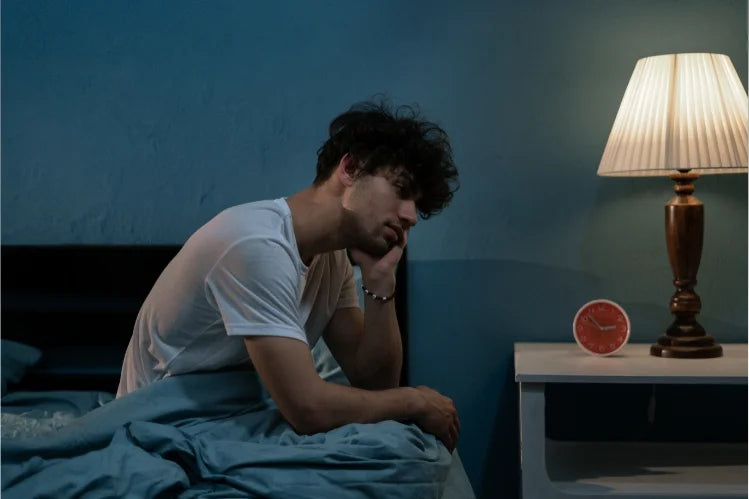Table of contents
Suffering from sleep apnea can have adverse effects on your life, including the constant struggle for peaceful sleep. While both surgical and lifestyle changes are an option, is using night guards actually effective for alleviating sleep apnea?
In this blog, we’ll discuss everything you need to know about sleep apnea and how night guards can help with bruxism and breathing difficulty resulting from it.
What Is Sleep Apnea?
Sleep apnea is a sleeping disorder that involves the fluctuation of air intake several times when sleeping. This deprives you of both essential oxygen and a comfortable rest.
Another variation of sleep apnea, known as hypopnea, causes the rate of breathing to be significantly lower than usual, lowering the oxygen intake as well. This causes the body to jolt and wake up as a cervical reflex, leading the patient to start choking and gasping for air as soon as they wake up.
Types Of Sleep Apnea
There are three major types of sleep apnea:
- Obstructive Sleep Apnea (OSA): The tongue, tonsils, or other tissues of the mouth relax and cause airway blockage.
- Central Sleep Apnea: Less common and more uglier than OSA. Central Sleep Apnea (CSA) stems from neural problems where the brain doesn’t send the correct signals to breathing muscles.
- Complex Sleep Apnea: A hybrid of both OSA and CSA.
Symptoms of Sleep Apnea
Here’s what you need to look out for:
- Gasping for air during sleep
- Bruxism: Grinding teeth
- Loud snoring
- Fatigue and mood changes
- Sleepy during the day and weak memory
- Bedwetting (in children).
Who Is More At Risk To Be Affected?
Apart from being born with it, i.e., genetic dispositions and gender, certain factors can also lead to a higher risk of sleep apnea, which include:
- Obesity
- Old age More common in men
- People on opioid pain relief
If you wake up panting, snore loudly, or feel tired even after a full night's sleep, you might have sleep apnea. It is time to consult an expert who can better guide you through the process. Remember, there's a solution to this constant struggle.
How Do Night Guards Help?
Treating Bruxism
While night guards don’t cure sleep apnea, there’s one symptom they can help you deal with, which is relieving the grinding of teeth, which has been a symptom strongly associated with sleep apnea.
While we empathize with your suffering and hope you are on your path to recovery soon, you can find solace in night guards to deal with bruxism and shift your jaw position to enable better breathing.
Reduced Muscle Tension
Bruxism frequently results in temporomandibular joint (TMJ) discomfort, jaw pain, and tense muscles. By protecting and covering the teeth, they provide a cushion that eases tension in the facial muscles. Night guards can help relieve these symptoms and lessen the stress and strain on the jaw muscles as you sleep.
Why Use Night Guards?
Custom-Fit
ALIGNERCO Night Guards are custom-tailored to fit snugly on your teeth. The process involves us sending an expression kit to you, which is then sent back to us alongside the impressions of your teeth on it. Once, we assess the impressions and craft your custom-fit night guards.
Easy To Manage
Our night guards are easy to pack as they can be stored in a case as small as a coin purse. This also makes the night guards easy to carry in case of traveling. Along with saving your precious pearlies from unnecessary grinding at night, our night guards are cost-effective.
Dealing with a sleeping disorder as severe as sleep apnea can take a toll on your health. The constant struggle to get a good night’s sleep can seem like a fantasy. With the recent advancements in the orthodontic world, although there have been several treatment options made available to patients suffering from it, night guards seem to be the best option that provides comfort alongside effective treatment.
FAQs
1.How do night guards help with sleep apnea?
Night guards provide a solution to teeth grinding (bruxism), which also causes sleep apnea and may aid in breathing by adjusting the position of the jaw slightly.
2. Can night guards cure sleep apnea?
While night guards can’t seemingly cure sleep apnea, it is best to consult a doctor for a treatment suited to you.
3. How can I get a perfect fit for my Night Guards?
How can I get a perfect fit for my Night Guards?
Related Blogs
https://alignerco.it/blogs/blog/managing-discomfort-during-orthodntic-treatment













